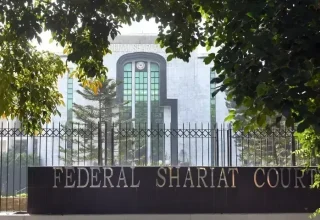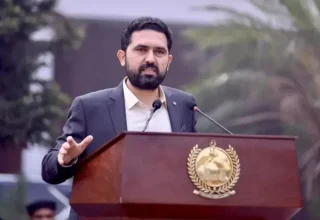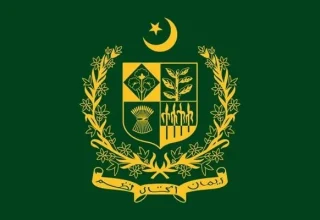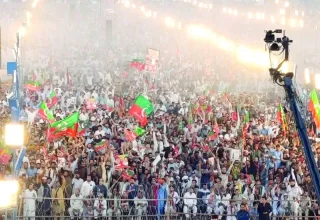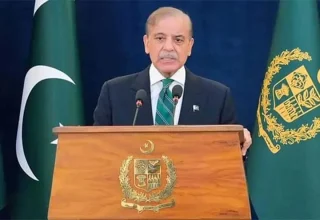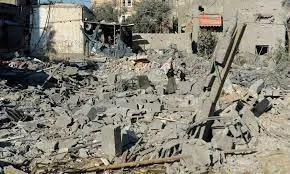
Israeli forces were on Sunday readying for a looming ground invasion of Gaza, where the United Nations estimated that one million Palestinians have been displaced in the war’s first week.
In the eight days since Hamas fighters killed more than 1,300 Israelis in their surprise onslaught, Israel has responded with a devastating bombing campaign that has claimed over 2,300 lives in Gaza.
Key developments
- Rallies held in Karachi, Sydney, Morocco, Amsterdam in support of Palestinians
- UN says Israel’s evacuation order has triggered a ‘mass displacement’ towards south of Gaza; UN official says situation is ‘catastrophic’
- Over 2,300 killed in Gaza, over 400,000 people displaced; 1,300 Israelis dead
- Aid for Gaza stuck in Egypt with Rafah crossing closed
Fear and chaos reigned in the 40 kilometre (25-mile) long strip that is one of the world’s most densely populated areas.
Entire Gaza city blocks lay in ruins and hospitals were overflowing with thousands of wounded in the besieged territory, but there were fears of worse to come.
Israel has massed forces outside the long-blockaded enclave of 2.4 million in preparation for what the army has said would be a land, air and sea attack involving a “significant ground operation”.
Special forces have made forays into Gaza and recovered the bodies of some of the 126 confirmed hostages taken by Hamas, the army said without specifying how many.
A Gaza ground invasion threatens to bring the kind of gruelling house-to-house fighting that devastated Iraq’s Mosul and Fallujah in years past, further complicated for Israeli forces by Hamas’ vast tunnel network.
“An estimated one million people have been displaced in the first seven days” of the war in Gaza, Juliette Touma of the UN agency supporting Palestinian refugees told AFP.
According to the United Nations, Israel’s evacuation order has triggered a “mass displacement” towards the south of the Palestinian enclave.
“Mass displacement from the north to the south of the Gaza Strip has been ongoing since… Friday morning, after Israel ordered residents to evacuate the areas ahead of military operations,” the UN’s humanitarian agency OCHA said in an update.
“Humanitarian partners report that the number of internally displaced persons (IDPs) has risen significantly over the last 24 hours; however the exact number is unknown.”
Around 64 per cent were being hosted by UNRWA, the UN agency supporting Palestinian refugees, in 102 premises operated as designated emergency shelters.
“Some 33,054 IDPs had taken refuge at 36 public schools,” said OCHA.
“It is estimated that over 153,000 IDPs, whose homes have been destroyed or damaged, or have left their homes due to fear, are residing with relatives and neighbours, as well as in other public facilities.”
Since Friday thousands of Gazans, who cannot leave the enclave as it is blockaded by both Israel and Egypt, have packed what belongings they can into bags and suitcases, to trudge through the rubble-strewn streets.
A stream of cars, trucks, three-wheeled vehicles and donkey-drawn carts joined the frantic mass movement south, all loaded with families and their belongings, mattresses, bedding and bags strapped onto the roofs of packed vehicles.
Convoys of humanitarian aid stacked up near Egypt’s border with the Gaza Strip on Sunday, unable to enter the Palestinian enclave being bombarded by Israel, witnesses told AFP.
The Rafah crossing the only passage in and out of the Gaza Strip not controlled by Israel has been closed since Tuesday, after three Israeli air strikes on the Palestinian border post within 24 hours.
On Saturday, an American official confirmed to AFP that Egypt and Israel had reached an agreement to allow American citizens to leave Gaza via Rafah.
However, Egypt has imposed conditions on the deal.
Officials refused for “the crossing to be designated for only foreigners to cross,” according to Egyptian news channel Al-Qahera News, which has ties to Egyptian intelligence agencies.
“The Egyptian stance is clear, which requires the aid to arrive in Gaza,” the report added, as alarm grows over shortages of essential supplies in the blockaded territory.
On Sunday, witnesses said concrete blocks installed by the Egyptians to fortify the border following Israel’s bombings were still in place, suggesting that no passage was being considered in the immediate future.
Already, shipments of aid from Jordan, Turkey and the United Arab Emirates had arrived at El Arish airport 50 kilometres (31 miles) west of Rafah alongside enough medical supplies supplied by the World Health Organisation to meet the needs of 300,000 people.
Egypt itself has sent a convoy of 100 transport trucks carrying 1,000 tonnes of aid.
Israel, which controls the other two crossing points into Gaza, has declared a “complete siege” of the Palestinian coastal enclave, cutting off food, water, fuel and electricity supplies to the territory’s 2.4 million people.
Some Palestinians who went south said they were heading back north because they were attacked from the skies wherever they went.
“What’s the point? They are bombing in Gaza City and they are bombing here in Nusseirt (in central Gaza Strip), also in Khan Younis and Rafah,” said Abu Dawoud, a Gaza accountant.
“I am taking my family back into Gaza. I can’t continue to live in a school or outside my home, when no place is safe anyway, my home is better,” he said.
Hussam Abu Safiya, an intensive care doctor on a children’s ward at the Kamal Edwan hospital in the northern Gaza strip, said the order to evacuate was impossible.
“In this ward as you can see, there are children who are attached to ventilators, and now we have been asked to evacuate the hospital, where should we evacuate these children?”, he said.
Hamas has said dozens of people were killed in strikes on cars and trucks carrying refugees on Friday. Reuters could not independently verify this claim.
Some Gazans have vowed to stay, remembering the “Nakba,” or “catastrophe,” when many Palestinians were forced from their homes during the 1948 war that accompanied Israel’s creation.
The Israeli military said on Saturday the bodies of some of the dozens of hostages abducted by Hamas in its attacks had been found during operations inside Gaza.
Hamas earlier reported 22 hostages had been killed in Israeli bombardments. Israeli Prime Minister Benjamin Netanyahu, wearing a flak jacket, earlier visited troops on the border front line, raising expectations of an imminent invasion.
“Are you ready for what is coming? More is coming,” he was heard telling several soldiers on a video released by his office.
To avert the risk of the conflict between Israel and Hamas escalating into a regional conflict, the United States deployed a second aircraft carrier that would “deter hostile actions against Israel”, Secretary of Defence Lloyd Austin said.
Alarm has grown over the fate of Palestinian civilians in blockaded and besieged Gaza one of the world’s most densely populated areas, home to 2.4 million if it becomes the scene of intense urban combat and house-to-house fighting.
The Palestinian Health Ministry said early on Sunday that 300 people had been killed and 800 more had been injured in Gaza during the last 24 hours.
Aid agencies have said forcing Gazans to move is impossible while the conflict rages.
But with food, water, fuel and medical supplies running low because of an Israeli blockade, aid agencies are warning of a deepening humanitarian crisis.
Gaza’s electricity outage threatens to cripple the enclave’s life-support systems, from sea water desalination plants to food refrigeration and incubators in hospitals.
“The situation is catastrophic,” said Jumaa Nasser, who travelled from Beit Lahia in northern Gaza with his wife, mother and seven children.
“We’ve had no food or sleep. We don’t know what to do. I’ve given my fate up to God,” he told AFP.
The World Health Organisation (WHO) said on Saturday that forcing thousands of hospital patients to evacuate to already overflowing hospitals in the southern Gaza Strip could be “tantamount to a death sentence”.
Exiled Hamas chief Ismail Haniyeh accused Israel on Saturday of committing “war crimes” in Gaza but he ruled out any “displacement” of Gazans, including to Egypt.
Hamas is regularly accused by Israel of using civilians as human shields.
On the diplomatic front, Chinese envoy Zhai Jun will visit the Middle East next week to push for a ceasefire and promote peace talks, state broadcaster CCTV reported on Sunday.
Saudi Arabia has also pressed for an “immediate ceasefire”. Russia said it had asked the UN Security Council to vote on Monday on its ceasefire resolution.
Pope Francis called for humanitarian corridors in Gaza and urged that “children, the sick, the elderly, women and all civilians should not fall victim to the conflict”.
“There have already been so many deaths, please let’s not shed any more innocent blood,” he said, castigating “the diabolical force of hatred, terrorism and war”.
Thousands of people took to the streets in major cities across the world on Sunday to express solidarity with Palestinians and protest the Israeli aggression on Gazans.
Over the weekend, a swarm of people came to the streets in Paris, London, Washington DC, Germany and other countries despite resistance by authorities. Huge gatherings were also held in Middle Eastern countries such as Iraq, Iran, Lenabon and Syria.














